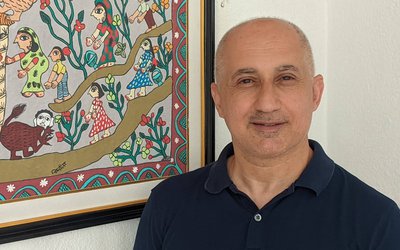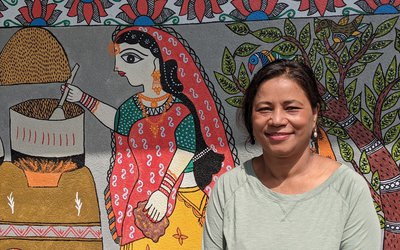As the Conference of Parties 17 on United Nations Convention on Climate Change is going to be held in Durban, South Africa, Nepal is leading a delegation to take part in the conference. Environment secretary KRISHNA GYAWALI spoke to NEW SPOTLIGHT on various issues in that context. Excerpts:
What is there for the least developed counties like Nepal in COP 17?
COP 17 has several agendas. For Nepal and the Least Developed Countries like Nepal, the agenda which is going to matter is adaptation and mitigation. In mitigation, we will see the extension of Kyoto protocol. The Kyoto Protocol will expire in 2012 December. The first commitment period will conclude by then. The protocol was adopted in 1997 and was effective from 2005. Seven years were in the first commitment period. Then what next? An interim order or continuation? This is very important for a country like Nepal and least developed countries. Our stand is 1.5 degrees Celsius, but the developed countries want less than 2 degrees Celsius. The Annex 1 countries are also flexible in temperature. In a recent meeting in Dhaka on climate vulnerabilities, the participant countries stressed the need to stick to 1.5 degrees Celsius. Least Developed Countries, and G 77+ China have been demanding the temperature at 1.5 degrees Celsius as a global temperature. By 2070 how much pollution needs to be reduced. There is the need to reduce the pollution by 50 and 55 percent. The rate of reduction is also important. Developed countries or Annex 1 countries are demanding that the grouping like Brazil, India China and South Africa and Argentina also need mitigation. Nepal’s contribution is negligible in mitigation as its contribution is 0.025 only. BRICS countries are trying to deviate from it. The role of LDCs is very important this time as the challenges before LDCs is to bring Annex 1 countries and G77+ China together.
What about mitigation?
Since our contribution to global emission is very negligible, mitigation is not the priority of Nepal. What we are concerned is adaptation. We need to plan designs for adaptation. We need to mainstream climate change in development plan and development system. For this we need huge resources as well as technology. It comes to making technology transfers. There is going to be two basic things, first we want to have access in transfer of technology mechanism as green climate fund mechanism. LDCs have been demanding unhindered access in green climate fund mechanism. In Cancun, the parties agreed to create a fund of 100 billion dollars each year to 2020. Our demand is that the developed countries should fulfill the demand by addition of additional money each year starting from 2013. In Green Climate Fund, least developed countries should be given unhindered, direct access. Now, there are various agencies which are blocking the fund. We want government’s direct access in the fund. Other demand is that up to 75 percent of money accumulated in the fund should be allocated to adaptation. LDCs demand is that the developed countries should be allocated as the money just to deal with climate change related issues. They should not double count the money such as with the fund given to poverty alleviation.
What is the mitigation process as Nepal has been spending a lot of money for mitigation?
Clean energy is a part of mitigation. In mitigation, we talk about low carbon emissions. REED+ reforestation are some of the powerful agenda of mitigation. Through clean energy we can emit less emission resulting in carbon stock. We can do a carbon trade. We can make benefits from carbon trade. It will also contribute to Nepal’s green economy and sustainable development. Mitigation part is also very important for a mountainous country like Nepal with predominantly agricultural economy. There is renewable energy and REED+ in mitigation. In energy mix, we cannot completely give up traditional energy system like nuclear energy and diesel energy. There are disputes and debates over nuclear energy. However, we are stressing for other sources of renewable energy like solar, wind and improved stoves and biogas. Our stress is for solar energy.
As many groups are going to Durban from Nepal, how do you plan to ensure coordination among them?
We are trying to intensify in country consultation. We held at least a couple of such consultations. What I am trying to do is at least to make common stand among the government delegation. We cannot control those who are going in the observer status and but we can make certain status as party status. There must be a common stand from official delegates. The official delegates include some officials of INGOs like WWF, and Climate Change Network. We will hold a major consultative meeting under the chairmanship of the minister for environment. We are also planning to form a forum for consultative meeting. We are developing some mechanism for allocation of responsibility, sharing feedbacks and reporting.
How many projects does the Ministry of Environment have now?
We have been implementing a number of programs. Nepal climate Change Support Program DFID/EU, Pilot Project for Climate Resilience (PPCR) is in the pipeline and Climate Investment Fund (CIF) US$ 86 M has just started.
Similarly, scaling up of renewable energy program of Climate Investment Fund (CIF) US$ 40 pipeline. Energy sector assistance program II Danida, Norway, Germany, DFID US$ 60 M will phase out in July 2012 and to be Replaced by RREP USD 160 M Rural Energy for Rural for Livelihood WB, UNDP , US$3.3 Ongoing/ pipeline. Renewable Energy Project EU US$ 18 M, Biogas Support Program SNV, KFW US$ 2.4 M., Improved Water Mill Support Program (ADB) US$ 1.1 M are ongoing.
Several other projects are either underway or implemented. Some projects supported by UNDP, DANIDA, DfID and GEF have already been completed.
Preparation of second national communication under the framework Convention on Climate Change, Global Environment Facility, GEF US$ 45000 is an ongoing project.
What about renewable energy program?
We can link renewable energy program with mitigation and there are five components under PPCR. This is 86 million dollar concessional credit project. We have just 0.2 service charge. Out of five components two are related to Ministry of Forest and one component is related to the Department of Hydrology and Meteorology on climate related hazard. Another project is under our ministry which is related to how to mainstream the climate. Other is related to private sector and agriculture. All the components in the projects are in the process of take off. We have completed NAPA and cost with 325 plus but we are yet to have enough funds.
What about LAPA?
Now we are working how to turn the National Adaptation Plan into Local Adaptation Plan of Action (LAPA) which has already been approved by Climate Change Council. Nepal Climate Change Support Program is part of the program which the government is implementing in 13 districts of mid-western and far-western region. We have been implementing the projects through Energy and Environment Unit of District Development Committees. We will strengthen the capacity of the units and will add some more employees. The total amount consists of 16.5 million euro and this is the grant of DfID and European Union. Out of total budget, 80 percent resources will be sent to the field and remaining will be spent for capacity building. We will sign the negotiations soon. In mitigation, we are launching scale up renewable energy program. We have prepared investment plan for 40 million dollar project. It is in the process of finalization.
How are you going to present Nepal in COP?
We are trying to be different than in the past. We want to be visible. Our ambassador in UN will participate. Two secretaries from Nepal government will participate. We will raise our interest along side with LDCs. Other main highlights will be to organize a mountain day. We are hosting international conference on mountain countries and climate change in April 2012 that will also be highlighted during the side event. There will be side events of mountain countries that will be organized by ICIMOD and that is for the cause of international conference on mountain countries. Besides, there are many other events like Meeting of Minds, which is going to be organized by ICIMOD. All these events will give us a platform to make us visible and to help a particular task of interest on behalf of countries which have commonalities with us. Senior government officials and experts will participate. One of the expert members of the Climate Change Council will be there. We will let them know about our plans.
- TANAHU HYDROPOWER PROEJCT: A Significant Achievement
- Apr 15, 2024
- AMBASSADOR HANAN GODAR: Sharing Pain With A Nepali Family
- Mar 30, 2024
- VISIT OF KfW AND EIB TO NEPAL : Mission Matters
- Mar 25, 2024
- NEPAL BRITAIN SOCIETY: Pratima Pande's Leadership
- Mar 24, 2024
- NEPAL ARMY DAY: Time To Recall Glory
- Mar 15, 2024
















